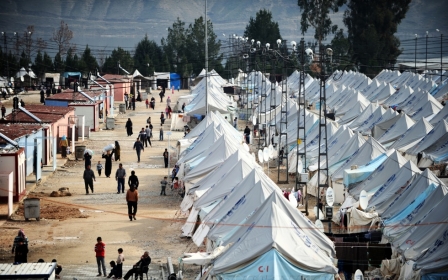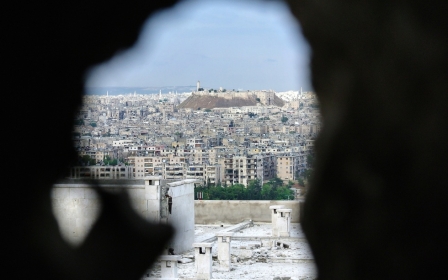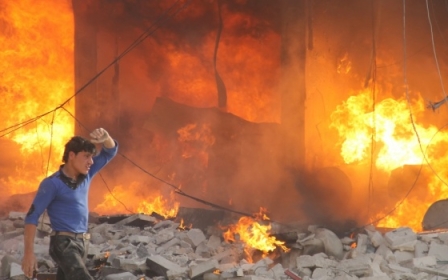Aleppo citizens seek normalcy on both sides of the sniper-lane

ALEPPO, Syria - As Mohammed’s body slouched over the plastic dinner table, he picked up a green pepper with his right hand and dipped it in salt. Without removing any chili seeds, he crunched on it slowly and rubbed his dreary eyes. He looked exhausted. It had been a long day.
Then the room reverberated after a barrel bomb, followed by another, was dropped on a neighbourhood close by in the opposition-held area of Aleppo, formerly Syria’s most populous city.
Mohammed didn’t flinch. It’s something he, along with the city’s remaining citizens, have become used to.
“Just think of it as music to our ears,” he said.
Sandbags have replaced the windows in the building where Mohammed sleeps, eats and works. Government forces have targeted this building twice using 900 kilograms of explosives and metal scraps.
Mohammed is a surgeon, on call 24 hours a day, seven days a week.
He shares a small room at the hospital with several other doctors - the few that remain in this city. Thin mattresses are crowded next to one another on the floor.
There’s even mattresses on the floor outside the two operating rooms where sleep deprived doctors, in between operations, try to get some much-needed shut eye.
“Every day is like this,” he said, after numerous patients, including two children, were brought in for emergency surgery following an air strike.
“Some days I do 13 operations. I have no choice but to stay. There’s so few of us left. It’s my country, my city, how can I leave?”
His work is physically and mentally demanding. But what also takes an emotional toll is that his family – his wife and children – are in Lebanon. He moved them there months ago to give them a better, safer life.
“I see my family every two months. It’s hard but I must do this work.
“If the regime finds us here, they will kill us all.”
Separated families
Separated families are a common theme in Aleppo.
Countless families have been ripped apart because of the situation in two ways:
Some have decided to stay in Aleppo for work and have sent their families to safer ground, largely in Turkey. Other families have been torn apart because of the “sniper lane” in the Bustan Al-Qasir neighbourhood, which divides the city between the opposition and government-held areas.
This “sniper lane”, where diggers have raised up a mound of earth and parked a bus in front of it in an attempt to protect civilians, made headlines last year after a doctor revealed government snipers were targeting pregnant women as they crossed to the other side of the city for food and other supplies.
It is so dangerous that people do not attempt to make the crossing any longer.
“I have not seen my fiancé for two years,” one man who works in a small factory in Aleppo said.
“She lives on the regime side. I can’t get through to see her and she can’t come to see me. We will be killed. I wanted to move her to Turkey but that would cost thousands of dollars. I don’t have enough money.”
Over a Turkish coffee, he opened his phone and proudly showed endless photos of his fiancé and him together before the war. They were so happy together, he added, saying they speak every day over Skype.
“I hope that we will meet again soon. I want to have two children with her.”
Another man, Abdul, with a large belly and curly brown hair, is responsible for delivering medicines and supplies around Aleppo and its countryside.
“I was studying my Masters in a private university so I thought I was in a good situation [before the revolution], but when I saw blood on the floor, I could not stand by and watch,” he said.
Government forces targeted his home twice before he decided to move his family to Turkey. But he continues to work in Aleppo and visits his family when he can.
“All of the people that were part of this revolution didn’t want this. I had no option but to stay. When you see the blood of kids and the people, if you have any dignity, you feel you must stay and do something.”
Challenges
But for those who remain, life is far from easy.
After two years of chaos, Aleppo is abandoned, devoid of any life.
Inside the ancient city that is one of oldest populated urban centres in the world, characterised by its narrow alleys and historic buildings, now is next to nothing except demolished homes, shattered glass and broken dreams.
It is hard to imagine life here before the war.
Irregular electricity, expensive food and dirty water, if any at all, have become the norm.
Some neighbourhoods are completely empty, with no one in sight. All that remains is rubble from barrel bombs that continue to wreak havoc from the sky.
In other neighbourhoods, there’s some life, with people pushing fruit and vegetable carts down the street, while shoeless kids beg for money in the alleyways. But many people are fearful of gathering, as crowds attract unwanted attention.
Most residents have fled to Turkey; others have died. Many remain at the Turkey/Syria border, living in derelict conditions, unable to enter the country because they do not have a passport.
Despite the situation, many people here said they are no longer afraid of the idea of death. They have become used to it.
“We used to be scared of the snipers and everything, but now we just laugh,” Osama, a driver, said.
“What else can you do?”
But for those remaining citizens, what unites them is their loyalty to their city, for as long as the battle continues.
- Sophie Cousins is a freelance journalist.
Middle East Eye propose une couverture et une analyse indépendantes et incomparables du Moyen-Orient, de l’Afrique du Nord et d’autres régions du monde. Pour en savoir plus sur la reprise de ce contenu et les frais qui s’appliquent, veuillez remplir ce formulaire [en anglais]. Pour en savoir plus sur MEE, cliquez ici [en anglais].




